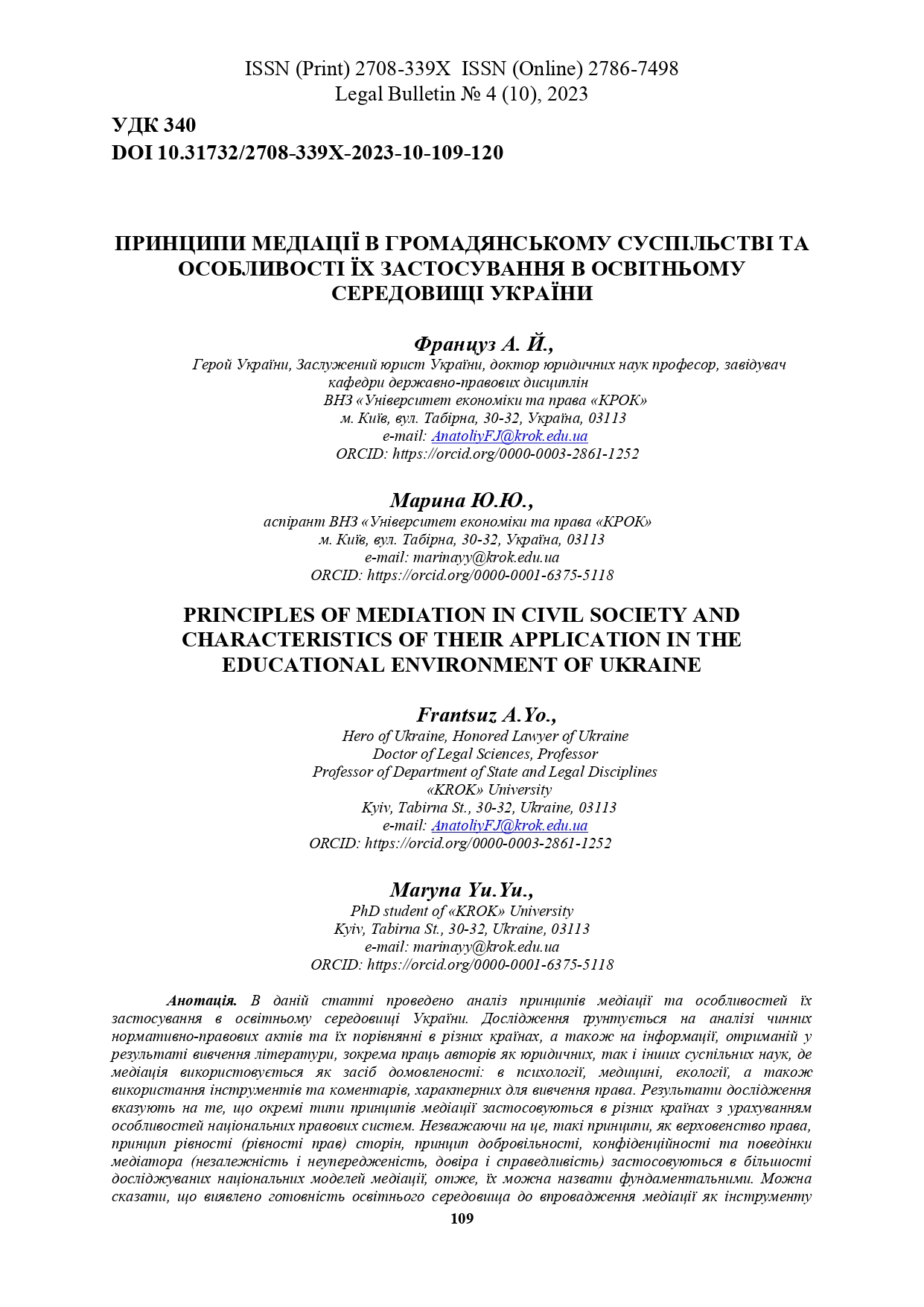PRINCIPLES OF MEDIATION IN CIVIL SOCIETY AND CHARACTERISTICS OF THEIR APPLICATION IN THE EDUCATIONAL ENVIRONMENT OF UKRAINE
DOI:
https://doi.org/10.31732/2708-339X-2023-10-109-120Keywords:
: mediation, legal system, alternative dispute resolution, dispute, privacy and voluntariness, educational environment, civil society institutionsAbstract
This article analyzes the principles of mediation and the features of its application in the educational environment of Ukraine. The study is based on the analysis of current regulations and their comparison in different countries, as well as on information obtained from the study of literature, in particular the works of authors from the legal sciences and other social sciences, where mediation is used as a means of agreement: in psychology, medicine, ecology, as well as the use of tools and comments specific to the study of law. The results of the study indicate that certain types of mediation principles are applied in different countries, taking into account the characteristics of law national systems. Despite this, principles such as the rule of law, the principle of equality (equal rights) of the parties, the principle of voluntariness, confidentiality, and mediator behavior (independence and impartiality, trust and justice) are applied in most of the studied models. National mediation systems, therefore, can be called fundamental. It can be said that the availability of the educational environment to introduce mediation as a conflict resolution tool in the educational environment has been discovered. In Ukraine, the draft law “On Mediation” defines the general principles of mediation; however, the problem lies in insufficiently clear criteria for disputes, which cannot be translated into mediation. Furthermore, the principle of the rule of law must be defined as one of the fundamental principles of mediation.
In Ukraine, civil society institutions themselves are trying to introduce and popularize mediation as an alternative dispute-resolution method. However, systemic problems with access to justice require finding other ways to resolve conflict situations. Mediation becomes especially relevant in the context of the COVID-19 coronavirus pandemic, the large-scale invasion of the territory of Ukraine by Russia, and the occupation of some regions of Ukraine, when access to the judicial system is limited.
References
Про медіацію: Закон України (Відомості Верховної Ради (ВВР), 2022, № 7, ст. 51). URL: https://zakon.rada.gov.ua/laws/show/1875-20 (дата звернення: 26.06.2023)
Йосипенко С. Т. Принципи медіації у приватно-правових відносинах. Науковий вісник УжНУ. Серія ПРАВО. 2015. 35(1). С. 130-133.
Красиловська З. Становлення інституту медіації в системі публічного управління: теоретико правовий аспект. Національна академія державного управління при Президентові України. 2017. 20 с.
Любченко І.П. Альтернативні способи вирішення правових спорів: теоретико-правовий аспект. Національний юридичний університет імені Ярослава Мудрого. 2018. С. 131.
Мазаракі Н.І. Теоретико-правові засади запровадження медиації в Україні. Докторська дисертація, Інститут законодавства Верховної Ради України Інститут законодавства Верховної Ради України. Інститут законодавства Верховної Ради України. 2019. URL: http://instzak.rada.gov.ua/uploads/documents/31793.pdf (дата звернення: 29.09.2023).
Можайкіна О.С. Поняття та зміст основних принципів медіації в цивільно-правових відносинах. Актуальні проблеми вітчизняного правознавства. 2017. 5. С. 55-58.
Оренчук Г. О. Добровільність та конфіденційність як основоположні принципи медіації. Наше право. 2014. 10, 177-183.
Єнін М. Н., Макаренко Д. В., Северінчик О. П. Медіація в освітньому просторі закладів вищої освіти: у пошуках моделі та способів організації. ВІСНИК НТУУ “КПІ”. Політологія. соціологія. Право. 2019. 3(43). С. 59-64.
Amirthalingam K. Medical Dispute Resolution, Patient Safety, and Physician-Patient Relationships, Singapore Medical Journal. 2017, 58(12), с. 681-684.
Biard A. Impact of Directive 2013/11/EU on Consumer ADR Quality: Evidence from France and the UK. J Consum Policy. 2019, 42, 109-147, URL : https://doi.org/10.1007/s10603-018-9394-z (дата звернення: 26.09.2023).
Brian A.L. Understanding and Application of Alternative Dispute Resolution Meth- Understanding and Application of Alternative Dispute Resolution Methods in Contemporary Medical Conflicts. Journal of Legal Medicine. 1998, 19(3), 397-430, URL : https://doi.org/10.1080/01947649809511069 (дата звернення: 06.10.2023).
Burton J. Conflict: Resolution and Prevention. St. Martin’s Press. 1990. 295 с.
Deason E.E. The Quest for Uniformity in Mediation Confidentiality: Foolish Consistency or Crucial Predictability? SSRN Electronic Journal. 2001. URL: http://dx.doi.org/10.2139/ssrn.289402 (дата звернення: 01.10.2023).
Hall M. Exploring the cultural dimensions of environmental victimisation. Palgrave Commun 3. 2017. URL: https://doi.org/10.1057/palcomms.2017.76 (дата звернення: 15.09.2023).
Melenko O. Mediation as an Alternative Form of Dispute Resolution: ComparativeLegal Analysis. European journal of law and public administration. (2020). 7(2), 46-63. URL: https://doi.org/10.18662/eljpa/7.2/126 (дата звернення: 03.10.2023).

Downloads
Published
How to Cite
Issue
Section
License
Copyright (c) 2024 Француз А.Й., Марина Ю.Ю.

This work is licensed under a Creative Commons Attribution 4.0 International License.




